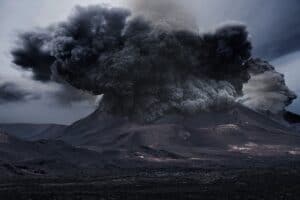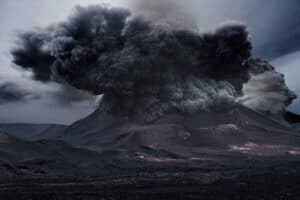How climate change impacts volcanic activity
 1 Maret 2022
1 Maret 2022
Photo: Pixabay/Julius_Silver
As human-made climate change becomes more influential, we can expect to see more extreme responses from our environment. Among these responses is increased volcanic activity.
If our world’s conditions stay on their current trajectory, volcanic eruptions will likely increase during the coming decades. But how exactly does climate change affect volcanic activity?
Volcanoes are unstable weak points in the Earth’s upper layer of rock. They form when chambers of magma boil to the surface. It takes a lot of heat and pressure to force molten rock to the surface, which means an eruption can take thousands of years to develop.
When the volcano can no longer contain the pressure, it bursts open, sending billows of toxic fumes into the air and lava onto the surface. The smallest eruptions are negligible, but the greatest ones cause widespread damage.
Volcanoes form at vulnerable points, or “hot spots,” in the earth’s tectonic plates. Some spots are more susceptible to eruptions than others.
Based on this cycle, we can see that changes on the Earth’s surface and below the surface are directly correlated. With that in mind, scientists have ample evidence to suggest that as the world continues to heat up, volcanoes will become more active, potentially creating a domino effect of changes across the globe.
What the science says
Evidence for this theory has come chiefly from studies by the University of Cambridge and the University of Leeds, both located in England.
Researchers at Leeds wanted to understand how the pressure exerted by Earth’s glaciers onto the crust impacts movements below the surface. This process, known as “surface loading,” can change the flow of magma and thus lead to more volcanic activity.
The study, which took place in 2017, looked back at the activity of Iceland’s many volcanoes 4500 to 5500 years ago, when Earth was still recovering from the latest Ice Age.
Based on the amount of ash deposited in the surrounding area, they concluded that the island’s volcanoes became more active and extreme as more ice melted.

While they’re unsure of the details, the mechanics that explain this phenomenon are straightforward. Glaciers put immense pressure on the Earth’s surface, restricting the flow of magma. When the glaciers melt, magma can move more freely, bubbling to the surface and erupting more easily.
The Cambridge study, released in 2021, suggests that climate change will transform the cooling effects of volcanic eruptions. As the atmosphere warms, the smoke and fumes from eruptions will be able to rise higher. The fumes might also travel farther, affecting regions half a world away.
The most remarkable example occurred in 1991 when Mount Pinatubo in the Philippines erupted and sent its gases 30 kilometers (18.6 miles) into the sky. The eruption created a global haze and lowered the world’s temperature by about 0.5 degrees Celcius, or almost one degree Fahrenheit.
Thankfully, the cooling lasted for two years, but as the climate gets more extreme, these massive eruptions might have more lasting effects.
The study also found that more minor scale eruptions, like the 2011 Nabro eruption in Eritrea, will not affect the climate as much. Climate change has widened the tropopause (the gap between the stratosphere and troposphere), putting the stratosphere out of reach from smaller eruptions. Fumes that remain in the troposphere can be washed away with precipitation.
To summarize, the two studies in question suggest that 1) melting glaciers caused by climate change will increase volcanic activity and 2) a warmer atmosphere caused by climate change will increase the effects of major volcanic eruptions.
Future Possibilities
The researchers at Leeds acknowledged that Iceland’s unique geography and proximity to enormous glaciers might have heightened the effects, and the changes might not be as extreme in more stable climates.
However, vulnerable areas of the world with many volcanoes might be in grave danger. They specifically pointed out the following regions: Pacific Northwest, Southeast Asia, Southern South America, as well as Arctic Circle and Antarctica
Scientists at Cambridge believe that climate change will increase the cooling effects of volcanic eruptions by up to 15% in the coming decades. When we also consider the belief of scientists at Leeds that eruptions will increase, the combined effects could be apocalyptic in scope.
If these studies are proven correct, humanity has to prepare by gathering precious resources. People can do their own bit such as by finding a clean water supply and stockpiling food. They could also consider developing a garden in their backyard and learning basic survival techniques.
When it comes to climate change, you can leave nothing to chance. We must also address necessities like clothing, shelter and medical care. If humans continue to destroy the climate, we must be prepared to face the consequences.
The post How climate change impacts volcanic activity appeared first on Sustainability Times.
